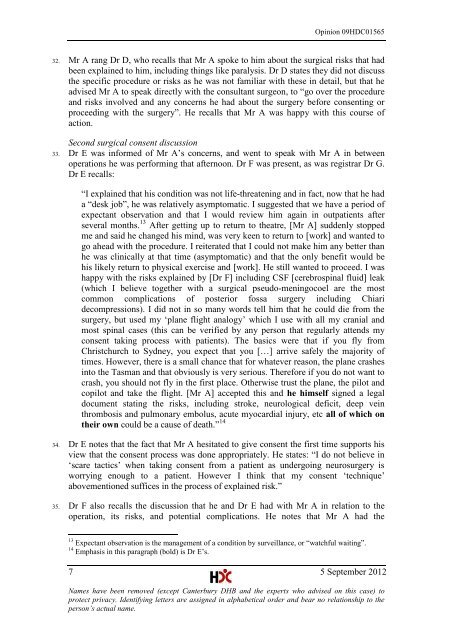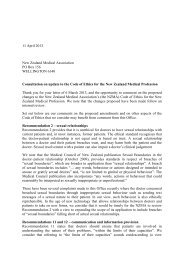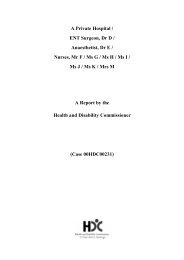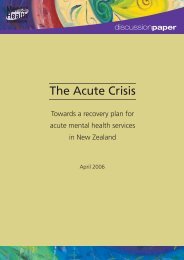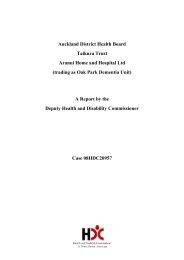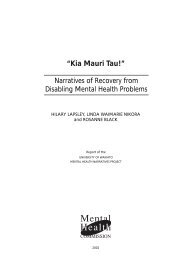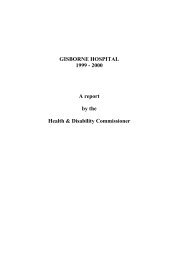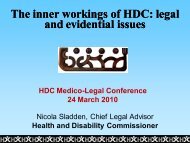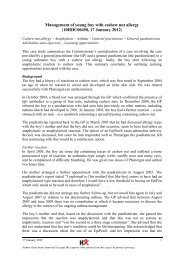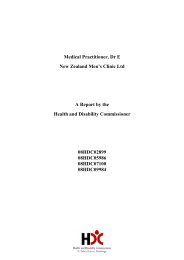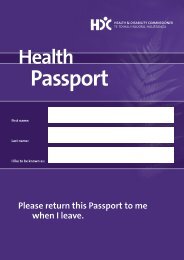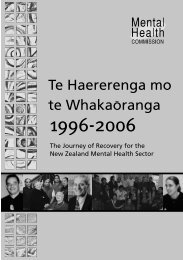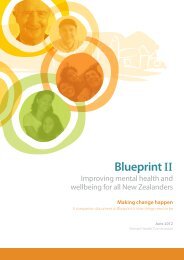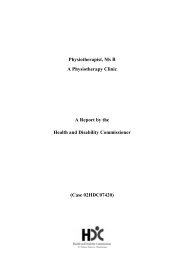09HDC01565 - Health and Disability Commissioner
09HDC01565 - Health and Disability Commissioner
09HDC01565 - Health and Disability Commissioner
Create successful ePaper yourself
Turn your PDF publications into a flip-book with our unique Google optimized e-Paper software.
Opinion <strong>09HDC01565</strong><br />
32. Mr A rang Dr D, who recalls that Mr A spoke to him about the surgical risks that had<br />
been explained to him, including things like paralysis. Dr D states they did not discuss<br />
the specific procedure or risks as he was not familiar with these in detail, but that he<br />
advised Mr A to speak directly with the consultant surgeon, to ―go over the procedure<br />
<strong>and</strong> risks involved <strong>and</strong> any concerns he had about the surgery before consenting or<br />
proceeding with the surgery‖. He recalls that Mr A was happy with this course of<br />
action.<br />
Second surgical consent discussion<br />
33. Dr E was informed of Mr A‘s concerns, <strong>and</strong> went to speak with Mr A in between<br />
operations he was performing that afternoon. Dr F was present, as was registrar Dr G.<br />
Dr E recalls:<br />
―I explained that his condition was not life-threatening <strong>and</strong> in fact, now that he had<br />
a ―desk job‖, he was relatively asymptomatic. I suggested that we have a period of<br />
expectant observation <strong>and</strong> that I would review him again in outpatients after<br />
several months. 13 After getting up to return to theatre, [Mr A] suddenly stopped<br />
me <strong>and</strong> said he changed his mind, was very keen to return to [work] <strong>and</strong> wanted to<br />
go ahead with the procedure. I reiterated that I could not make him any better than<br />
he was clinically at that time (asymptomatic) <strong>and</strong> that the only benefit would be<br />
his likely return to physical exercise <strong>and</strong> [work]. He still wanted to proceed. I was<br />
happy with the risks explained by [Dr F] including CSF [cerebrospinal fluid] leak<br />
(which I believe together with a surgical pseudo-meningocoel are the most<br />
common complications of posterior fossa surgery including Chiari<br />
decompressions). I did not in so many words tell him that he could die from the<br />
surgery, but used my ‗plane flight analogy‘ which I use with all my cranial <strong>and</strong><br />
most spinal cases (this can be verified by any person that regularly attends my<br />
consent taking process with patients). The basics were that if you fly from<br />
Christchurch to Sydney, you expect that you […] arrive safely the majority of<br />
times. However, there is a small chance that for whatever reason, the plane crashes<br />
into the Tasman <strong>and</strong> that obviously is very serious. Therefore if you do not want to<br />
crash, you should not fly in the first place. Otherwise trust the plane, the pilot <strong>and</strong><br />
copilot <strong>and</strong> take the flight. [Mr A] accepted this <strong>and</strong> he himself signed a legal<br />
document stating the risks, including stroke, neurological deficit, deep vein<br />
thrombosis <strong>and</strong> pulmonary embolus, acute myocardial injury, etc all of which on<br />
their own could be a cause of death.‖ 14<br />
34. Dr E notes that the fact that Mr A hesitated to give consent the first time supports his<br />
view that the consent process was done appropriately. He states: ―I do not believe in<br />
‗scare tactics‘ when taking consent from a patient as undergoing neurosurgery is<br />
worrying enough to a patient. However I think that my consent ‗technique‘<br />
abovementioned suffices in the process of explained risk.‖<br />
35. Dr F also recalls the discussion that he <strong>and</strong> Dr E had with Mr A in relation to the<br />
operation, its risks, <strong>and</strong> potential complications. He notes that Mr A had the<br />
13 Expectant observation is the management of a condition by surveillance, or ―watchful waiting‖.<br />
14 Emphasis in this paragraph (bold) is Dr E‘s.<br />
7 5 September 2012<br />
Names have been removed (except Canterbury DHB <strong>and</strong> the experts who advised on this case) to<br />
protect privacy. Identifying letters are assigned in alphabetical order <strong>and</strong> bear no relationship to the<br />
person’s actual name.


